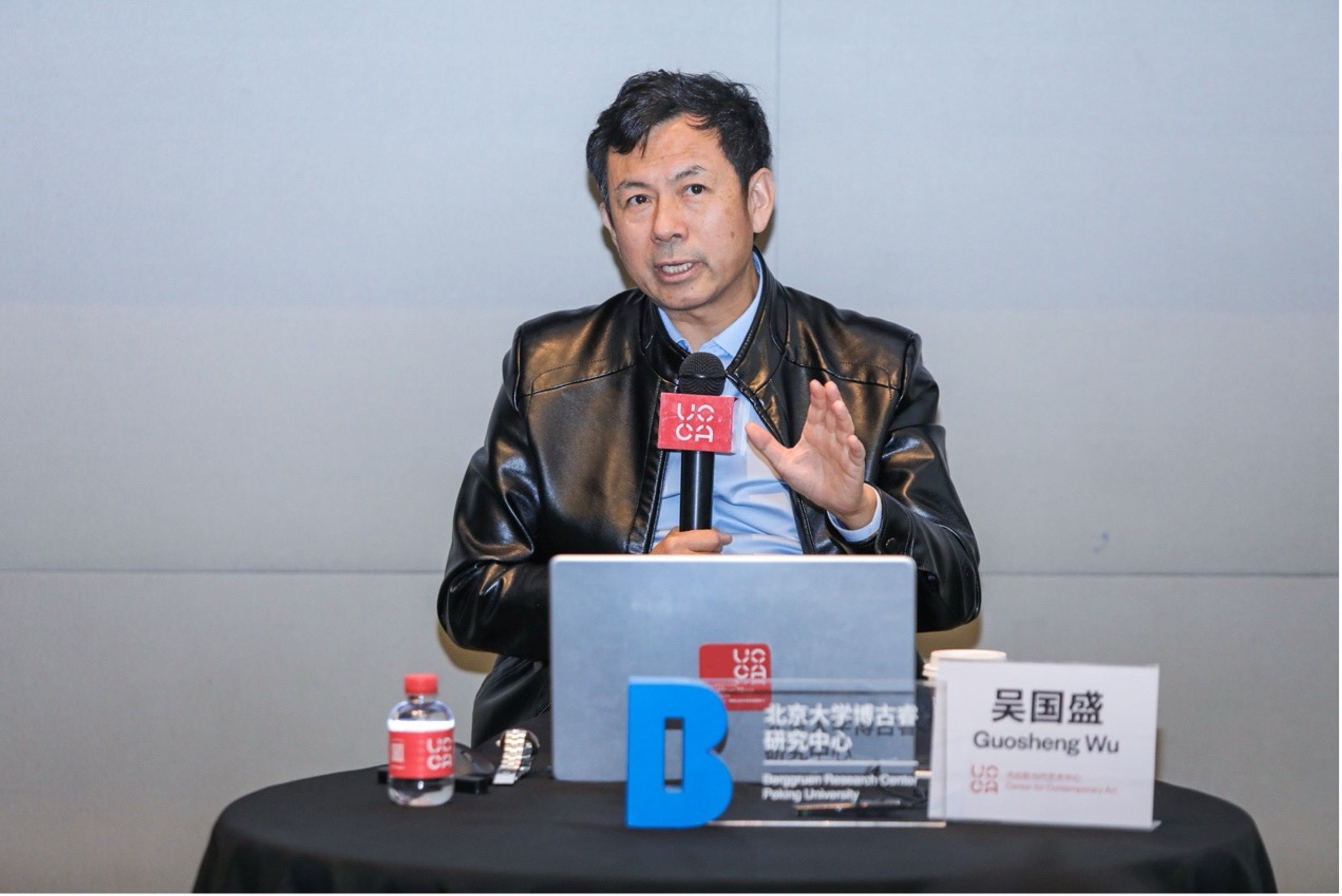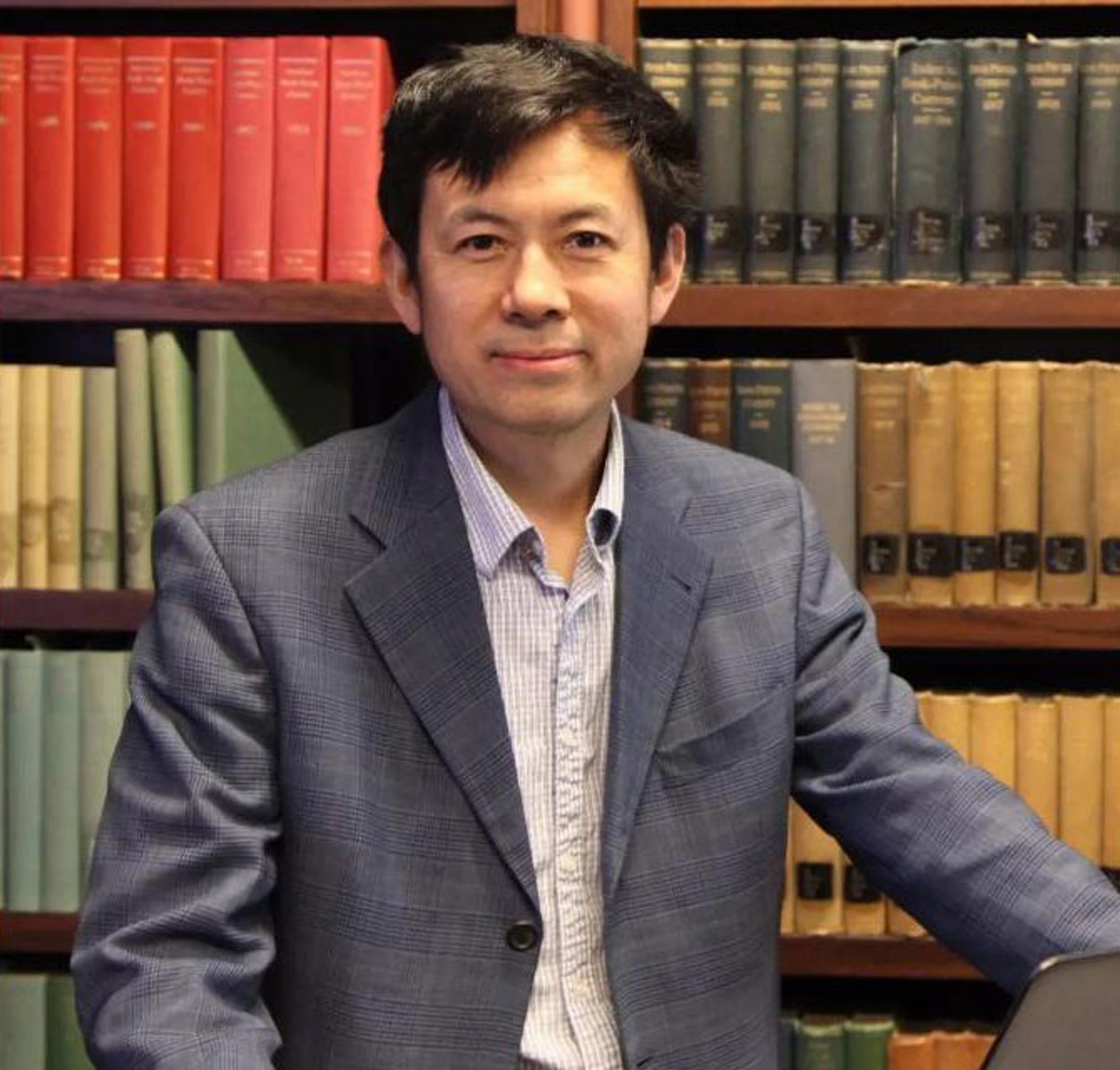Rupture and Reconstruction: Leaving Earth, Heading Towards the Universe
- Date: November 25, 2023
- Location: Auditorium, Ullens Center for Contemporary Art, 798 Art Zone, Beijing
The fourth session in the series “Rupture and Reconstruction: Multiple Perspectives on Modernity,” jointly organized by the Berggruen Research Center at Peking University and UCCA, was held at the UCCA Auditorium in Beijing on November 25, 2023. This lecture, titled “Leaving Earth, Venturing into the cosmos,” featured keynote speakers Professor WU Guosheng, Professor and Chair of History of Science Department in Tsinghua University, and Professor SUN Zhouxing, Dunhe Chair Professor at Zhejiang University and Changjiang Scholar of Chinese Ministry of Education. Their discussion focused on the paradoxical concepts of “venturing into the cosmos” and “dwelling on Earth.”

Wu traced the evolution and the inner logic of these two concepts, before returning to the question of how modern humans might overcome nihilism through self-reflection and self-rescue. From a philosophical angle, Sun reviewed and critiqued the multiple impacts of Anthropocene technologies on human civilization and envisioned the possible human stances towards modern technology.
Historical Trajectories: The Copernican Revolution and a Will-Based Anthropocentrism
Wu noted that “venturing into the cosmos” and “returning to Earth” corresponded respectively to two grand narratives of technological development and environmental protection. The former has grown increasingly significant with the deepening of modernity, while the latter, embedded in the mid-to-late 20th century postmodern discourse, gained prominence as a public issue with the rapid rise of environmental movement. The concept of “venturing into the cosmos” centers on elevating human agency and advancing technological progress. As it gradually develops and intensifies, it naturally gives rise to the counter trend of “returning to Earth,” represented by environmental protection. Over time, these two discourses have become increasingly intertwined in a dialectical relationship. To clarify both concepts, Wu proposed that we must trace their conceptual lineage in the history of science and examine their conceptual framework and internal logic in terms of necessary and sufficient conditions.
The necessary condition for “Venturing into the cosmos” is closely related to the Copernican Revolution. Copernicus overturned the Ptolemaic-Aristotelian cosmos, which conceived the heavens and Earth as fundamentally distinct and concentric. Copernicus instead posited a physically homogeneous and isotropic universe, anticipating the modern cosmological principle. The development of modern physics then facilitated the replacement of the classical physics notion of “place” (topos) with the modern concept of “space.” Beyond merely shifting the center of the cosmos, his theory more profoundly erased the boundary between celestial bodies and Earth. It fostered the idea that extraterrestrial worlds might resemble the terrestrial Earth and making the literal “flight to the heavens” conceivable. Only thereafter could scientists like Descartes, Galileo, and Newton establish a modern quantitative physics distinct from the older qualitative tradition and propose the infinitude of time and space. At this point in history, humans truly began to conceive of outer space.
Copernicus’ theoretical groundwork lay in the late-medieval Christian movement of nominalism, which emphasized God’s absolute omnipotence, devalued human senses, challenged the Greek reverence for reason and cosmic order, and believed in a fundamental equality of all beings before God. Along with the concept of an “infinite universe,” nominalism helped establish the philosophical claims concerning human finitude.

The concurrent rise of Christian voluntarism after the Renaissance, namely Nietzsche’s “will to power,” became the impetus for “heading toward the Universe.” Contrary to Freud’s claim that the Copernican Revolution dethroned anthropocentrism and returned humanity to the irrational and the unconscious, Wu argued that it did not debase humanity; rather, it underscored humanity’s capacity for self-transcendence and gave birth to a new will-based anthropocentrism. Only by transcending the constraints of human and earthly perspective, and imagining through “God’s eye,” could humans grasp the Copernican heliocentric system. This exemplifies how individual will enables self-transcendence. In modern thought, anthropocentrism reappears by elevating spirit and will over sense and reason. As an important part of modernity, voluntarism, coupled with human finitude, ultimately provides the impulse behind technological development and the drive towards the universe.
Yet, as Steven Weinberg wrote, “The more the universe seems comprehensible, the more it also seems pointless.” Embedded in this intellectual lineage of “venturing into the cosmos” is the root of modern nihilism and the crisis of science. The mathematization of modern physics tends to homogenize the world. In such a world, things lose their intrinsic nature and become indistinguishable particles. The human will, seeking to make itself the measure of all things, constructs the world from its own perspective. This very “bestowal,” however, intensifies the world’s meaninglessness. How, then, can we recognize and overcome nihilism in this context?
“Dwelling on land and returning to Earth,” therefore, emerges as strategy for self-salvation. One prevalent remedy for “modern displacement” is a return to “topos” and a rethinking of “space.” In the twentieth-century philosophy, these explorations are, in essence, an inquiry into the ontological meaning of the Earth: What is Earth? Is it a geometric sphere, the “thick earth (厚土)” of Chinese thought, or even a Noah’s Ark and a spaceship?
According to Wu, modern society is characterized by a sense of suspension in midair and weakened conception of Earth. Human self-rescue depends on reviving the native metaphors of earth and sky. Just as astronauts often find themselves gripped by a special tenderness for Earth, the farther we soar toward the universe, the more we may come to cherish the Earth and feel the pull to return.
Anthropocene Technologies and “Non-Anthropocene”: Digital Existence and the Inevitable Venturing into the cosmos
Sun, by contrast, appeared to take an opposite intellectual path. After outlining the irreversible impacts of Anthropocene technologies and the two divergent routes before us, “becoming digital existence” and “heading into space,” he ultimately emphasized the inevitability of “leaving” rather than the possibility of “returning.”

Sun first introduced the concept of Anthropocene, which started in 1945 based in the work of geologists and philosophers. Humans became the dominant force reshaping geology and evolution, causing surface transformation, rising temperatures, and the sixth mass extinction. From a philosophical perspective, however, the Anthropocene is a “non-Anthropocene,” marked by the destruction of organic and embodied humanity. The atomic bombing of Hiroshima marked the beginning of the “non-Anthropocene” era, an event which surpassed the bounds of human reason and cognition, ushering in an era of absolute nihilism. Meanwhile, the rise of technological industry reconfigured what it means to be human and gave rise to a survival crisis. More specifically, four core technologies of the Anthropocene, nuclear weapons/energy, endocrine disruptors, artificial intelligence, and biotechnology, under the guise of progress, have alienated and negated human civilization. This has precipitated spiritual and material challenges for humanity, ruptured cultural and historical continuity, and put additional pressure on the Earth’s habitability.
Against this backdrop, where can humanity possibly go? Sun argued that technological industry offers two directions: “digitization” and “venturing into the cosmos.” Both directions rest on the comprehensive shift since the Industrial Revolutions from human civilization rooted in the natural world to one rooted in technology. More profoundly, they reflect a transformation in thought itself, from linear to relational time, from decimal to binary systems, from formal to mathematical logic, and from the atom to the bit as the primary medium. This shift forms the foundation of “digital existence.”
“Digital existence” can be defined as forms expressed through data and numerical relationships. It manifests in digital living, the metaverse, and the “global brain,” and develops through two dataist concepts: “universal algorithms” and “universal intelligence.” By treating the universe as computable data and applying mathematical theorems equally to biochemical and electronic processes, dataism dissolves the boundary between animal and machine, enabling disembodied and theoretically immortal digital life. It also frames space travel as a computable process, making “venturing into the cosmos” a feasible alternative as Earth grows increasingly uninhabitable.
Beneath these two options lies the deeper question: how should we face the technological world? In Sun’s view, scientific optimism, progressivism, and the entropic cycle of production and consumption are the outcomes of Anthropocene technological domination. They continue to transform humans into technological beings, making the coexistence of embodied and digital existence inevitable. Like Wu, Sun holds that “departure” and “return,” “venturing into the cosmos” and “dwelling on Earth,” are entangled rather than opposed; Sun, however, stressed that digital existence is inherently directed toward escaping the Earth. For a technological future of humanity, leaving Earth and venturing into the cosmos may become an inevitable, if reluctant, path toward transcendence.
---
Written by: Ma Lin
Translated by: Wang Zhenghao
Edited by: Chianna Cohen
All are from the Berggruen Internship Program.
About the Speakers:

WU Guosheng
